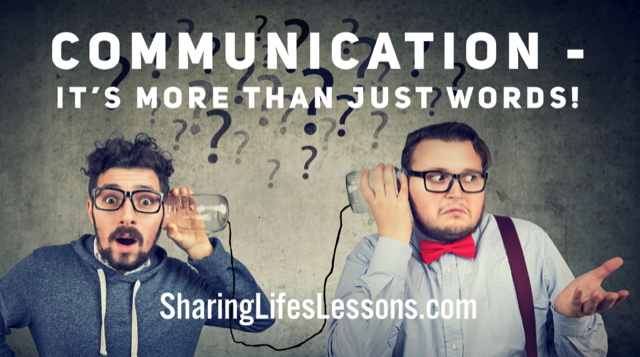Communication – it’s more than just words!
- 27
- September
- 2023

Communicating effectively is one of the most important life skills we can learn. Communication is how information is transferred to produce greater understanding. Words can contribute to raising, and lowering, understanding, but it takes more than just words for good communication. Lack of good communication not only shows up globally, but unfortunately, it can also show up close to home in relationships and families.
When people get together with friends and family, there can be misunderstandings. People want to avoid drama at get-togethers so sometimes guidelines are announced by the host. These guidelines often include avoiding discussions of religion and/or politics. Then people try to be mindful of their communication to avoid hurtful feelings. As Rachel Wolchin said, “Be mindful when it comes to your words. A string of some that don’t mean much to you, may stick with someone else for a lifetime.”
How could we all just accept each other’s differences of opinion and have lively discussions, where we all respect each other, learn something, and grow? This would also foster better relationships. As H. Jackson Brown said, “Never underestimate the power of words to heal and reconcile relationships.” We’ll share some communication ideas that may help to have better relationships.
What could help is if people communicated in ways that are clearly understood. George Bernard Shaw said, “The single biggest problem in communication is the illusion that it has taken place.” There’s so much to consider – what words are said, what words are not said, how the message was delivered, and how the message was received.
People can hear different messages, even when the words are the same. This is because people have past learning that impacts how they hear and respond to the words. This past learning (some people call it ‘baggage’) gets triggered. They may interpret what they hear as something else. For example, they might respond, ‘You sound just like my mother’. Old feelings of mom telling them what to do stealthily creep in, often without their awareness. Unfortunately, they could react to their interpretation of the message as if they were responding to their mom or another caregiver.
If you get an unusual reaction or response from someone, or you realize you are reacting too strongly, it’s good to clarify. Also, take time to reflect and see where exaggerated responses are coming from. As you see the connection, often it’s easier to hear the words and see the intent of another person more clearly. It’s well known that communication is not just about the words.
Communication is also about what’s not said. So, it isn’t just negative words that are a problem, it’s also the absence of positive words that can make a huge impression on people.
Childhood and close relationships, at any age, rely on being able to trust the other person. Everyone wants to be accepted and loved. If someone asks, ‘Do you love me?’ and the other person doesn’t answer, they might automatically assume they’re not loved and not lovable, even when they are.
The parent or spouse can do a lot of things to show their love, yet the child or other spouse often holds in their memory bank, that they’re not sure if they’re loved. So, it isn’t just negative words that are a problem, it’s also the absence of positive words that make a huge impression on people. Giving kind words to yourself and others is important. As Blaise Pascal said, “Kind words do not cost much. Yet they accomplish much.”
However, even when words are right and positive, we see how nonverbals can sometimes override the intended message. Nonverbals are how it’s said and are a critical part of communication. Have you ever known someone who says something, and their body language shows exactly the opposite of the words? Body language speaks loudly. It’s beneficial if it helps people to understand the real intent behind the other person. For example, if a manager says something is ‘pretty good’ but looks disgusted, it gives a message of discontent. However, if a manager gives the same message leaning forward and smiling, the message is likely a positive one of satisfaction.
What about you? We encourage you to look at how you communicate with others and with yourself. Are you encouraging or discouraging? What messages need to be clarified? What do you want to say that was left unsaid? Do your nonverbals match your words? As Robin Sharma said, “Words can inspire. And words can destroy. Choose yours well.” For the best communication, we encourage you to mindfully choose your words, and how you say them, so you can enjoy even better relationships.
Chanhassen MN residents, Doug and Lynn Nodland are success coaches and owners of The Balance Center in Excelsior. Contact them at WeCare@TheBalanceCenter.com
© Doug and Lynn Nodland 2023 Articles and videos may be shared in their entirety with attribution.
Search:
Categories
Archives
- April 2024
- March 2024
- February 2024
- January 2024
- December 2023
- November 2023
- October 2023
- September 2023
- August 2023
- July 2023
- June 2023
- May 2023
- April 2023
- March 2023
- May 2021
- April 2021
- March 2021
- February 2021
- January 2021
- December 2020
- November 2020
- October 2020
- September 2020
- August 2020
- July 2020
- June 2020
- May 2020
- April 2020
- March 2020
- February 2020
- January 2020
- December 2019
- November 2019
Contact Us
Doug Nodland J.D.
684 Excelsior Boulevard
Suite 120
Excelsior, MN 55331
952-452-2664
WeCare@TheBalanceCenter.com

